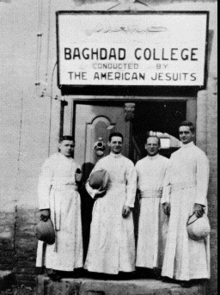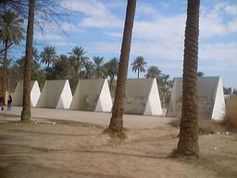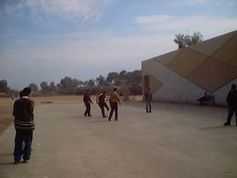Baghdad College
Baghdad College is an elite high school for boys in Baghdad, Iraq. It is among the nation's most highly regarded preparatory schools, boasting several well-known alumni and countless Iraqi professionals and intellectuals now living throughout the world. The school was initially located at 11/45 Murabba'ah Street in Baghdad, on the east bank of the Tigris River.
Jesuit tradition

In 1931, at the request of the Chaldean Patriarch of Baghdad and at the direction of Pope Pius XI, a group of four American Jesuits arrived in Baghdad and established Baghdad College as a secondary school for boys. Known as "BC on the Tigris", the school was staffed with priests from the New England Jesuit Province.
While Baghdad's Christians welcomed the Jesuits, Muslims were initially suspicious of their intentions. Muslims eventually embraced the institution as it became clear that the Jesuits' mission was to provide a rich education, and not a wholesale conversion of Muslims. The trust grew as the Jesuits at Baghdad College enthusiastically participated in Muslim and Christian feasts in the homes of their students. The commingling of traditions, cultures, and religions led to an unanticipated infusion of intellectual curiosity into the Baghdad community. Before the establishment of Baghdad College, prominent Baghdad families had sent their sons to Victoria College in Alexandria, Egypt. Baghdad College's closer proximity and superior education reversed this trend, and a network of contacts from well-known families grew out of the school.
During the pro-Nazi coup of Baghdad during World War II, the American Jesuits of the college continued their work when other Americans were fleeing. Their behavior was said to have impressed Iraq's Prime Minister so much that he enrolled his two sons in the school after the coup was put down.
Through the 1950s, the make-up of Baghdad College's student body was approximately 50% Muslim, 35% Catholic, and 15% Eastern Orthodox. Before the Jewish exodus of 1948-1951, Jews also constituted a significant proportion of the student body. Over time, the 25-acre (100,000 m2) campus grew to include nine major buildings, a boarding school, a minor seminary, a library, and laboratories. The success of Baghdad College led the Jesuits to establish another Baghdad school in 1956: Al-Hikma University.
Baathist nationalization
The Jesuits had deliberately avoided involvement in politics, but the threat of their expulsion from Iraq had always lingered. Despite wide acceptance in the Baghdad community, each government crisis offered an opportunity for successive governments to expel the Jesuits. Signals of serious trouble arose in 1967 when the American Embassy in Iraq closed as a result of the Six-Day War with Israel. The American Jesuits remained at the school despite the exodus of most Americans from Iraq.
In 1968, the Baathist coup drastically changed the country's political landscape. Private schools, Muslim and Christian alike, were nationalized, as had been done a decade earlier in Syria. Rejecting the pleas of Muslim professors at Baghdad University, the Baathist government seized Al-Hikma University and ordered the Al-Hikma Jesuits out of Iraq in November 1968, the first government of Iraq to do so Ignoring the warnings of the Baathists, hundreds of students gathered at the airport to bid farewell to the Jesuit Fathers, affectionately referred to by the Iraqis as fadheria. The government subsequently took control of Baghdad College on August 24, 1969 and gave the remaining 33 Jesuits three days to leave Iraq. In total, 145 Jesuits worked at Baghdad College. Five are buried next to the school's chapel, land that still belongs to the Society of Jesus. Baghdad College has remained a public institution since the Jesuit expulsion, and has retained its elite status.
1980s to present


During the 1980s, both Qusay and Uday Hussein, sons of Iraq's ruler, Saddam Hussein, attended the school, each terrorizing students and staff and flouting the school's strict rules. In an interview with the New York Times, school headmaster Yacob Yusef noted of the two brothers: "Qusay was very stupid; he got a 4 percent on one of his midterm examinations. Uday was smarter, sometimes the teachers would answer the questions for him." Omar al-Tikriti, son of Iraqi secret service leader Sabawi al-Tikriti, ran for student representative. When he received only two votes, his bodyguards beat the winner, leaving him paralyzed. All students were required to attend classes on Saddam Hussein.
In late 1993, Uday Hussein appointed himself as the school's president and immediately relieved the headmaster, Qutaiba Al-Durubi, from his duties. The plan was to restore the school to its pre-nationalization status, beginning with the appointments of Laith Al-Qassab, Muwaffak Al-Sam'ani, and Farid Arseen as Dean, Assistant Dean for Science Affairs, and Assistant Dean for Students Affairs, respectively.
In the summer of 1994, more than 70 students and teachers were forced to trensfer to other schools by an executive order from Saddam Hussein's Presidential Office. Among those forced out were Kurds and Turkmen and some who had non-Iraqi nationalities. The students and teachers were unable to complain or even mention the action in public, and it was not mentioned in the papers or on television news. The move was part of a plan by Muwaffak Al-Sam'ani, a graduate of both Baghdad College and Al-Hikma University and a professor at Al-Hikma University for several years during the 1960s, to restore the school's prestige. All scientific subjects were converted to the English language, some additional curricula were added, and the best teachers in the country were more or less forced to transfer to Baghdad College. Many of the original Jesuit-era traditions were restored including Al-Iraqi, the school's once famous yearbook.
Notable alumni
- Ayad Allawi, former Interim Prime Minister of Iraq
- Omar al-Tikriti, son of Iraqi secret service leader Sabawi al-Tikriti
- Ahmad Chalabi, Iraqi politician, former Interim Oil Minister, and former Deputy Prime Minister of Iraq.
- Uday Hussein, son of Saddam Hussein
- Qusay Hussein, son of Saddam Hussein
- Adil Abdul Mahdi, Iraqi politician, economist, and Vice President of Iraq from 2005 to 2011.
- Kanan Makiya, author and founder of the Iraq Memory Foundation.
- Nizar Hamdoon (1944-2003): Iraq's ambassador to the United States and the United Nations, a deputy foreign minister of Iraq and under secretary of its Foreign Ministry
See also
- The Gifted Students' School
www.baghdadcollege.net
References
Notes
Sources
- Dexter Filkins, "Boys of Baghdad College Vie for Prime Minister", New York Times, December 12, 2005
- MacDonnell, J. Jesuits by the Tigris. 1994. Boston, MA: Jesuit Mission Press